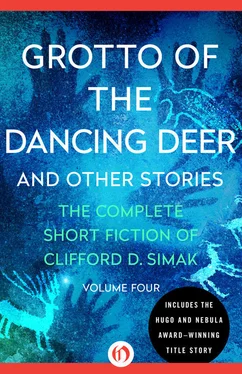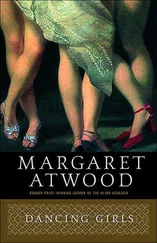Steps came up the path and drew closer. A man stood outlined in the gloom. A hunched, bow-legged man who shambled in the deepening dusk. Five feet away he stopped. “What are you doing here?” he asked.
“Walking,” said Packard.
The man moved closer. “If you’re goin’ where I think you’re goin’, you better change your mind.”
“Why?” asked Packard, flatly.
“The boss wouldn’t like you goin’ to see Page.”
Packard took a quick step forward and the man went for his gun. But Packard’s fist beat the gun, smacked against the jaw.
The man snapped backward, straight and stiff, rocking on his heels, hit the ground with a thump that bounced him.
Bending over the fallen man, Packard yanked the gun out of his belt, heaved it into the brush. Still squatting, he rolled another cigarette, used the match that he struck to light it to study the man’s face. But it rang no bells. If he’d seen him in the Crystal Palace, he did not remember it.
The man groaned and struggled to a sitting position, rubbed his hand tenderly against his jaw. His eyes found Packard, stared at him. His lips twisted. “The boss will get you for this,” he mumbled.
“He set you to tail me?” asked Packard.
The man nodded.
“He didn’t tell you to stop me from going anywhere or doing anything?”
“No, he didn’t, but—”
“But he wouldn’t want me to see Page.”
“That’s it,” said the man. “He’ll be sore as hell. Sore at both of us.”
“How do you know he didn’t send me to see Page?”
The man gaped. “Did he? Did the boss …”
“That,” said Packard, “is none of your damn business.”
Packard rose. “I’m going on,” he said. “If you want to come, I don’t mind. But see you stay behind … a long ways behind.”
Page opened the door at Packard’s knock, reached out a hand and dragged him in, thumped him on the back. “So you came,” he said. “You saw the Chinaman.”
Packard frowned. “Don’t get your hopes up, Preacher. I know what you have in mind, and I can’t do it.”
The old man’s silver hair was shining in the lamplight and the pictures were on the wall and the books still on the shelves. From the kitchen came the smell of frying meat and the quick, swift tap of a woman’s feet.
“But you killed Stover,” Page protested. “You gunned the fastest gunman this town has ever known. You got him even when he was sneaking up behind you, with his guns half out.”
“What’s your proposition?” Packard asked, flatly.
“A marshal’s badge,” said Page. “A marshal’s badge and other men to back you up.”
“Marshal’s badges,” said Packard, “can’t be picked up anywhere.”
“I can get you one,” Page told him.
“And while you’re talking the authorities into giving me one, what am I to do?”
“You’ll leave town tonight. There’s a trail over the mountain and I have a horse. You can get your men.”
“I haven’t any men,” said Packard.
“But … but …”
“Sure,” said Packard, “you’re just like the rest of them. You’ve got me pegged for an owlhoot rider. You figure that maybe I kill a man every day for breakfast. You figure that I have a band of curly wolves hidden out somewhere and that if you could get me to bring them in, we’d wipe out Randall’s gang in one grand blaze of gunfire.”
“But,” protested Page, “there would be compensations. Blanket pardons and—”
“I haven’t done a thing,” said Packard, “to be pardoned for, except maybe shooting Stover and that was self-defense. And I haven’t any men. So forget your dream of using me to clean up the town for you.”
The old man slumped into a chair, face suddenly haggard. “It was wrong of me,” he said, almost as if he were speaking to someone who wasn’t in the room. “It was not my way of doing, nor my church’s way of doing, but sometimes a man’s vision can be clouded. Force is wrong … as wrong for me to use as it is for Randall. But I was tempted. I saw a way to make this a decent town …”
“I’m sorry, Preacher,” Packard said.
“Don’t,” said a voice from the doorway, “waste any sorrow on us.”
Packard jerked his head around and saw the girl. He took off his hat. “Good evenin’, miss,” he said.
“I wish you wouldn’t come here,” she said, tartly. “It’s bad enough with Hurley seeing father all the time. I’ve told him that he ought to go away where he wouldn’t meet men like that. There isn’t any reason that he should stay out here when he could go somewhere else, some place that’s civilized.”
“Don’t pay any attention to her,” begged Page. “She’s angry. Angry because I’m sending her east to school. This isn’t any place for a woman to stay.”
But Packard scarcely heard the old man. He was looking at the girl. “Miss,” he said, “just to get the record straight, I want to tell you something. You maybe won’t believe me, but it really doesn’t matter. Until I killed Stover I never killed a man. But I am getting tired of two-bit gunmen wanting to add me to their kills so they can brag they killed Steve Packard’s kid. I don’t hanker to become a notch on someone’s gunbutt, miss, and I figure maybe the only way to keep from it is to collect some notches of my own.”
She did not speak, but from where he stood Packard could see the blood beating in her throat, could see her lips half open to reply, then close again.
“You’ve had bitter disappointment, son,” said Page. “And you are too impatient. There is good in the world—”
“I haven’t seen any of it,” snapped Packard.
“You came here,” said Page, “with something in your mind. I don’t know what it is, but you best get rid of it. It will bring you nothing but everlasting sorrow.”
“Save your preaching,” Packard told him, “for someone who wants to listen to it. It’s people like you who shove a man along a path he doesn’t want to travel and then use him as a horrible example when he up and follows it.”
He turned to the door and opened it. Then turned back. “You were right, Preacher,” he said. “I did come here for something and I’m going through with it.”
Out on the path he strode rapidly down the hill. Night had fallen and Hangman’s Gulch was a blur of darkness speared with blinking lights, filled with the hum of a fevered humanity.
It was all, Packard told himself, how you happened to be born. It your father killed men and held up stages and robbed banks, you killed men and held up stages and robbed banks. You might try hard not to do it. You might try to live another kind of life, but it would catch up with you in the end. As it finally had caught up with him. A man, after all, had to make a living somehow.
At the bottom of the hill, just before the path broke out on the street, a man stepped from behind a tree. Packard stopped, hands lifted to his guns.
“The horses,” said the man, “are up this way.”
Packard moved toward him, walking softly. Close at last, he asked: “You’re riding with me?”
“That’s right,” said the man. “Blade is the name. John Blade. Put her there, pardner. I’m proud to be ridin’ with you.”
By impulse, Packard put out his hand, found the other’s in the darkness. The man’s handclasp was swift and sure. Swift and sure and warm … a warmth that sent a thrill through Packard, a feeling of comradeship.
“Blade,” he said, “I’m proud to be riding with you, too.”
Chapter IV
DEATH FOR A PINCH OF DUST
The moon was late in rising and the night was dark, dark and chill, with an autumn wind whining along the ridges and whipping down the canyons. Blade seemed to know the way almost by feel and although they went slowly, there seemed no hesitation at the choosing of the path. Packard rode behind him.
Читать дальше












